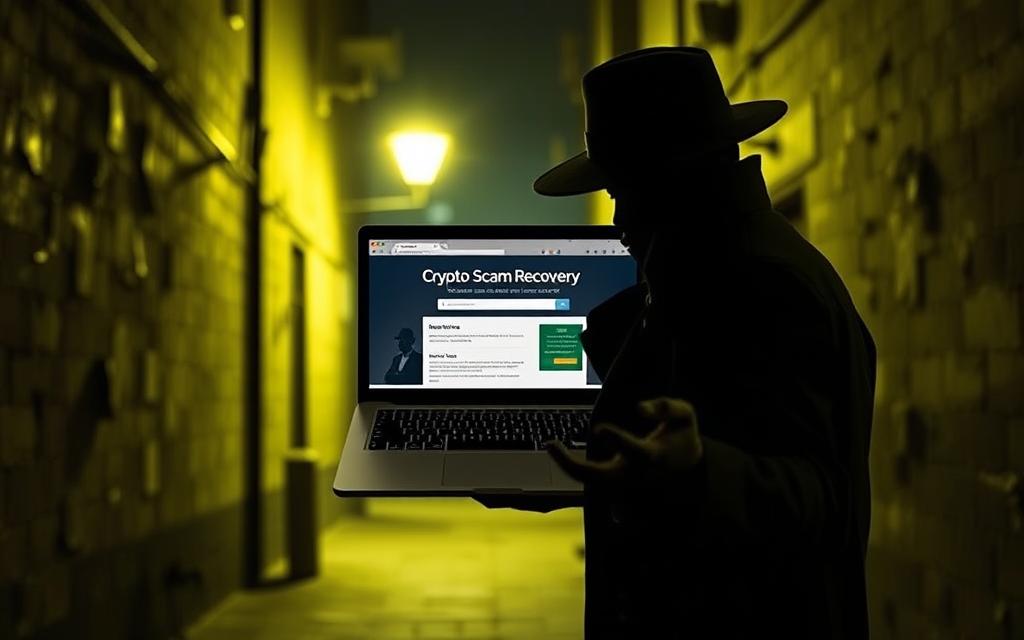Table of Contents
The rise of cryptocurrency has brought about new investment opportunities, but it has also led to a surge in sophisticated scams that have cost victims millions of dollars.
As crypto fraud increases, a new industry of recovery services has emerged, promising to help victims recover their stolen digital assets. However, many victims, desperate to recover their funds, turn to these services without properly vetting their legitimacy.
The decentralized nature of blockchain technology makes recovering lost or stolen cryptocurrency particularly challenging. For those who have fallen victim to crypto theft or fraud, understanding the realistic capabilities and limitations of recovery services is crucial.
This article will examine the trustworthiness of these services and provide guidance on distinguishing between legitimate recovery specialists and secondary scammers.
Understanding Cryptocurrency Scams and Recovery Challenges
Understanding the challenges in recovering cryptocurrency from scams is crucial in today’s digital landscape. Cryptocurrency scams have become a significant concern, with the recovery of lost or stolen funds being a major issue.
The Rising Problem of Cryptocurrency Fraud
Cryptocurrency fraud has seen a substantial increase, paralleling the rise in popularity of cryptocurrencies. Scammers are becoming more sophisticated, using various tactics to deceive victims. This has led to a significant number of people losing their crypto assets to fraudulent schemes.
Why Recovering Stolen Crypto Is Difficult
Recovering stolen cryptocurrency is challenging due to several factors. Two key reasons are:
Decentralization and Anonymity Issues
The decentralized nature of cryptocurrencies, while offering a level of anonymity, complicates efforts to trace and recover stolen funds. Transactions are recorded on a public ledger, but the identities behind these transactions are not always clear.
Irreversible Transactions
Cryptocurrency transactions are irreversible, meaning that once funds are sent, they cannot be retrieved unless the recipient decides to return them. This irreversibility is a significant hurdle in recovering stolen crypto.
Cross-Border Complications in Crypto Recovery
Cryptocurrency scams often involve cross-border transactions, complicating law enforcement efforts. Different countries have varying levels of cryptocurrency regulation and cooperation, making it difficult to track and recover stolen crypto assets.
| Challenge | Description | Impact on Recovery |
|---|---|---|
| Cross-Border Transactions | Transactions occur across international borders. | Makes jurisdiction and enforcement challenging. |
| Lack of Standardized Regulations | Different countries have different regulations. | Creates gaps that scammers exploit. |
| Anonymity and Decentralization | Transactions are pseudonymous and decentralized. | Complicates tracing and recovery of stolen funds. |
For those seeking help in recovering their stolen cryptocurrency, it’s essential to find a reputable recovery service. You can find more information on top recovery experts at https://pcsite.co.uk/top-recovery-experts-for-cryptocurrency/.
How Legitimate Crypto Scam Recovery Services Work
Legitimate crypto recovery services utilize a combination of technical and legal strategies to recover stolen funds. At Dynamis LLP, our team is dedicated to helping clients navigate the complexities of cryptocurrency asset recovery.

The Technical Process of Tracing Cryptocurrency
Tracing cryptocurrency involves sophisticated techniques to track the flow of stolen crypto.
Blockchain Analysis and Transaction Tracing
Our experts use advanced blockchain analysis tools to trace transactions and identify patterns that can lead to the recovery of stolen funds.
Identifying Wallet Addresses and Exchanges
We work to identify wallet addresses and exchanges where the stolen cryptocurrency is being held or laundered, facilitating the recovery process.
Legal Approaches to Recovering Stolen Funds
In addition to technical tracing, legitimate recovery services employ legal strategies to recover stolen funds.
Working with Law Enforcement
We collaborate with law enforcement agencies to report the scam and gather intelligence necessary for the recovery of stolen crypto.
Civil Litigation Options
When necessary, we pursue civil litigation to reclaim funds from those responsible for the scam or from exchanges that may be holding the stolen cryptocurrency.
Realistic Timeframes and Success Rates
Legitimate crypto scam recovery services are transparent about their success rates and the timeframes involved. Success rates typically range from 20-40%, depending on the specifics of the case and how quickly recovery efforts begin.
Warning Signs of Fraudulent Recovery Services
Cryptocurrency scam victims often fall prey to fraudulent recovery services; understanding the warning signs is key to avoiding further loss. When dealing with services that claim to help recover lost cryptocurrency assets, it’s essential to be cautious and vigilant.
Red Flags to Watch For
There are several red flags that indicate a recovery service might be fraudulent. Being aware of these can save you from further financial harm.
Guaranteed Recovery Promises
Be wary of services that promise guaranteed recovery of your cryptocurrency assets. Legitimate services will provide realistic assessments based on the specifics of your case.
Upfront Fee Requirements
Services demanding upfront fees without providing clear explanations of their methods or success rates are likely scams. Legitimate services usually offer transparent fee structures.
Lack of Verifiable Credentials
A legitimate recovery service should have verifiable credentials, including experience in handling crypto-related cases and a clear understanding of the legal landscape.
Common Tactics Used by Recovery Scammers
Recovery scammers often employ tactics designed to deceive and exploit vulnerable individuals. Understanding these tactics can help you avoid falling victim to such scams.
Targeting Vulnerable Victims
Scammers typically target those who have already been victimized by cryptocurrency scams, preying on their desperation to recover lost assets.
Creating False Hope
Fraudulent services create false hope by claiming they’ve located the victim’s stolen cryptocurrency or identified the scammer. They may fabricate progress reports, use technical jargon, or send fake screenshots to appear legitimate.
| Tactic | Description |
|---|---|
| False Progress Reports | Scammers fabricate reports to make it seem like they’re making progress in recovering your assets. |
| Technical Jargon | Using complex terminology to confuse victims and appear legitimate. |
| Fake Screenshots | Sending images that falsely show recovered cryptocurrency. |

At Dynamis LLP, we are dedicated to helping clients navigate the complexities of cryptocurrency asset recovery. Our team has extensive experience in handling crypto-related cases, and we take a client-centered approach to crafting solutions that align with your unique circumstances and goals.
Steps to Take If You’ve Been Scammed
If you’ve fallen victim to a cryptocurrency scam, taking immediate and informed action is crucial to mitigate losses and potentially recover your assets. The steps you take right after discovering the scam are critical.
Immediate Actions After Discovering a Crypto Scam
Upon realizing you’ve been scammed, it’s essential to act quickly. Here are the immediate steps to take:
Documenting the Incident
Start by documenting every detail of the scam, including transaction IDs, wallet addresses, and any communication with the scammers. This information will be vital for any recovery efforts.
Reporting to Authorities
Report the scam to relevant authorities, such as your local law enforcement and financial regulatory bodies. You can also file a complaint with the Federal Trade Commission.
Securing Remaining Assets
Immediately secure your remaining crypto assets by transferring them to a new, secure wallet. This step is crucial to prevent further loss.
Vetting Potential Recovery Services
If you’re considering hiring a recovery service to help you retrieve your lost assets, it’s crucial to vet them thoroughly. Here are some steps to follow:
Questions to Ask Before Hiring
Before engaging a recovery service, ask about their experience, success rates, and the strategies they employ. A reputable service should be transparent about their methods and provide clear expectations.
Checking Credentials and Reviews
Verify the service’s credentials by checking their business registration, reading reviews from independent sources, and looking into their team’s background. Ensure they have a track record of successfully helping clients recover their crypto.
Conclusion
In the complex and often treacherous realm of cryptocurrency, distinguishing between legitimate recovery services and fraudulent operations is crucial. The recovery industry is a mixed bag, containing both valuable assistance and scams preying on desperate victims. To protect your assets, it’s essential to approach any investment with caution and thorough due diligence. If you’ve fallen prey to a scam, prompt action and careful vetting of recovery services are key. For questions about cryptocurrency-related legal matters, don’t hesitate to reach out to experts who can guide you through the process.
FAQ
What are the chances of recovering stolen cryptocurrency?
The likelihood of recovering stolen digital assets depends on various factors, including the type of scam, the amount of time elapsed since the incident, and the effectiveness of the recovery process. Our team of experts works diligently to track and retrieve lost funds.
How do legitimate cryptocurrency recovery services operate?
Legitimate services utilize a combination of blockchain technology and legal expertise to identify and recover stolen cryptocurrency. They work closely with law enforcement agencies and financial institutions to maximize the chances of successful recovery.
What are the warning signs of a fraudulent recovery service?
Be cautious of services that demand upfront fees, guarantee unrealistic results, or lack transparency in their methods. Legitimate services will provide clear guidance on their process and associated costs.
How long does the recovery process typically take?
The duration of the recovery process varies depending on the complexity of the case and the cooperation of relevant parties. Our team provides regular updates and works efficiently to resolve cases in a timely manner.
Can I recover cryptocurrency lost to a phishing scam?
Yes, it is possible to recover cryptocurrency lost to phishing scams. Our experts analyze the blockchain to track the flow of stolen funds and work with relevant authorities to retrieve the lost assets.
Are there any additional costs associated with the recovery process?
Our fees are competitive and clearly outlined. We may incur additional costs when working with external agencies or experts, but these are always discussed and agreed upon in advance.









